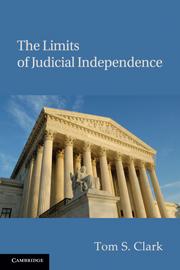Book contents
- Frontmatter
- Contents
- List of Tables
- List of Figures
- Acknowledgments
- 1 Introduction
- 2 A Political History of Court-Curbing
- 3 Conditional Self-Restraint
- 4 Court-Curbing and the Electoral Connection
- 5 Public Support and Judicial Review
- 6 Ideological Implications of Court-Curbing
- 7 The Limits of Judicial Independence
- Appendix A Elite Interview Methodology
- Appendix B Court-Curbing Bills, 1877–2008
- Bibliography
- Index
3 - Conditional Self-Restraint
Published online by Cambridge University Press: 05 August 2012
- Frontmatter
- Contents
- List of Tables
- List of Figures
- Acknowledgments
- 1 Introduction
- 2 A Political History of Court-Curbing
- 3 Conditional Self-Restraint
- 4 Court-Curbing and the Electoral Connection
- 5 Public Support and Judicial Review
- 6 Ideological Implications of Court-Curbing
- 7 The Limits of Judicial Independence
- Appendix A Elite Interview Methodology
- Appendix B Court-Curbing Bills, 1877–2008
- Bibliography
- Index
Summary
Why do members of Congress introduce Court-curbing bills? Do the justices of the Supreme Court care about those bills? How might the introduction of Court-curbing bills affect the Court's decision making? What role does Court-curbing play in understanding the balance of power among the branches of government? The political history of Court-curbing in the preceding chapter provides a useful starting point for thinking about these questions. In this chapter, I develop a theoretical argument that provides a framework for answering these and other questions. The key to the theoretical argument advanced here is understanding the motivation driving Court-curbing.
In Chapter 1, I described the scholarly debate about the degree to which Congress' power to reverse Supreme Court decisions constrains judicial decision making. In doing so, I suggested that a more explicit connection may be drawn between the separation of powers and judicial legitimacy than has been previously recognized. That connection can be made by considering the connection between elected representatives in government – especially, members of Congress – and the public. This chapter develops a theory of Court–Congress interaction in which judicial legitimacy is explicitly incorporated. To develop the theory, I explore the importance of judicial legitimacy for judicial independence. Building on evidence from interviews with Supreme Court justices, members of Congress, former law clerks, and legislative staffers, I establish a set of assumptions about judicial legitimacy and its relationship to the Court's decision-making process. I then formalize an interaction between the Court and Congress that rests on those assumptions.
- Type
- Chapter
- Information
- The Limits of Judicial Independence , pp. 62 - 121Publisher: Cambridge University PressPrint publication year: 2010



